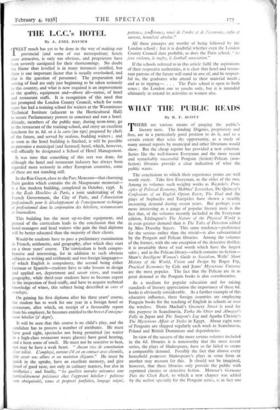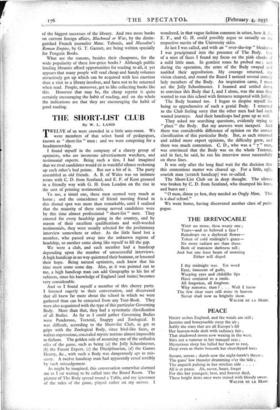WHAT THE PUBLIC READS
By It. F. SCOTT
THERE are various means of gauging the public's literary taste. The lending libtpries, proprietary and free, are in a particularly good position to do it, and to a certain extent they seize the opportunity, as a study of many annual reports by municipal and other librarians would show. But the cheap reprint has provided a new criterion. Series like the well-known Everyman and the more recent and remarkably successful Penguin (fiction)-Pelican (non- fiction) libraries provide a clear indication of what the public wants.
The conclusions to which their experience points are well worth study. Take first Everyman, as the older of the two. Among its volumes such weighty works as Ricardo's Prin- ciples of Political Economy, Hobbes' Leviathan, De Quincey's Confessions of an English Opium Eater, The Iliad and the plays of Sophocles and Euripides have shown a steadily increasing demand during recent years. But perhaps even more interesting as a gauge of popular literary taste is the fact that, of the volumes recently included in the Everyman edition, Eddington's The Nature of the Physical World is in even greater demand than is The Tales of Detection edited by Miss Dorothy Sayers. This same tendency—preference for the serious rather than the trivial—is also substantiated by the Penguin and Pelican libraries. Among the volumes of the former, with the one exception of the detective thriller, it is invariably those of real worth which have the largest sales ; and in the Pelican library—which contains no fiction— Shaw's Intelligent Woman's Guide to Socialism, Wells' Short History of the World, Vision and Design by Roger Fry, Practical Economics by Cole and Jeans' Mysterious Universe are the most popular. The fact that the Pelican are in as great demand as the Penguin books is also corroborative.
As a medium for popular education and for raising standards of literary appreciation the importance of these 6d. books is obviously considerable. As a further example of this educative influence, three foreign countries are employing Penguin books for the teaching of English in schools or over the wireless. Denis Mackail's Greenery Street is used for this purpose in Scandinavia, Tarka the Otter and Almayer's Folly in Japan and The Surgeon's Log and Agatha Christie's The Mysterious Affair at Styles in Egypt. About eight tons of Penguins are shipped regularly each week to Scandinavia, Poland and British Dominions and dependencies.
In view of the success of the more serious volumes included in the 6d. libraries it is noteworthy that the most recent series, the plays of Shakespeare, have so far failed to create a comparable demand. Possibly the fact that almost every household possesses Shakespeare's plays in some form or another may account for this. It should not be imagined, however, that these libraries only provide the public with reprinted classics or detective fiction. Mowrer's Germany Puts the Clock Back, to which a new chapter was added by the author specially for the Penguin series, is in fact one of the biggest successes of the library. And two more books on current foreign affairs, Blackmail or War, by the distin- guished French journalist Mme. Tabouis, and Mussolini's Roman Empire, by G. T. Garratt, are being written specially for Penguin Books.
What are the reasons, besides their cheapness, for the wide popularity of these low-price books ? Although public lending libraries afford opportunities for reading to all, it yet appears that many people will read cheap and handy volumes attractively got up which can be acquired with less exertion than a visit to a library involves, and have not to be returned when read. People, moreover, get to like collecting books like this. However that may be, the cheap reprint is quite certainly encouraging the habit of reading, and on the whole the indications are that they are encouraging the habit of good reading.















































 Previous page
Previous page